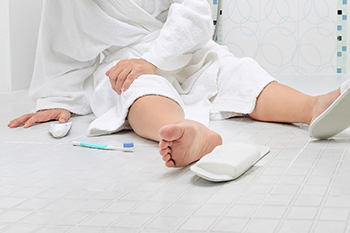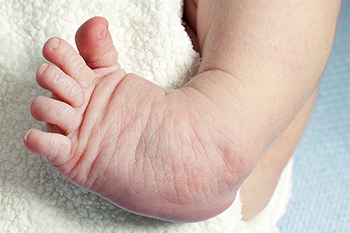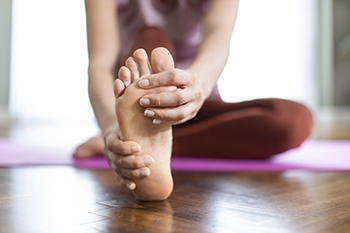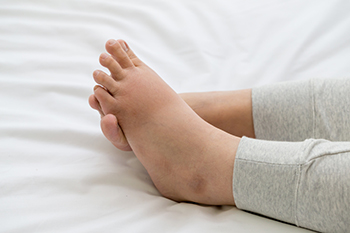Freehold (732) 294-9393
Freehold (732) 294-9393

Falls prevention is particularly important for the elderly population, who are more apt to suffer from fall-related injuries. Performing regular stretching and strengthening exercises are methods that can help to maintain balance. Ensuring loose carpets are adhered to the floor, halls are cleared of obstacles, and floors are dry, can help to avoiding falling at home. It is beneficial for medications to be checked for side effects that may cause dizziness or fatigue. Having eyesight regularly checked and updating prescription eyeglasses will keep vision issues under control. Routinely going to the doctor for examinations can help with staying ahead of current or emerging health conditions, which may possibly lead to falling. For example, if blood pressure is low or arthritic joints are inflamed, falls are more likely to occur. If you have had previous falls, and sustained an injury to your feet or ankles, it is suggested that you visit a podiatrist who can help you in all of these areas, and guide you toward effective fall prevention techniques.
Preventing falls among the elderly is very important. If you are older and have fallen or fear that you are prone to falling, consult with Dr. Henry Miller from New Jersey. Our doctor will assess your condition and provide you with quality advice and care.
Every 11 seconds, an elderly American is being treated in an emergency room for a fall related injury. Falls are the leading cause of head and hip injuries for those 65 and older. Due to decreases in strength, balance, senses, and lack of awareness, elderly persons are very susceptible to falling. Thankfully, there are a number of things older persons can do to prevent falls.
How to Prevent Falls
Some effective methods that older persons can do to prevent falls include:
Falling can be a traumatic and embarrassing experience for elderly persons; this can make them less willing to leave the house, and less willing to talk to someone about their fears of falling. Doing such things, however, will increase the likelihood of tripping or losing one’s balance. Knowing the causes of falling and how to prevent them is the best way to mitigate the risk of serious injury.
If you have any questions, please feel free to contact our office located in Freehold, NJ . We offer the newest diagnostic and treatment technologies for all your foot care needs.

Clubfoot is a common birth defect that can be detected before birth or at birth. It is when an infant’s foot points inward instead of forward. The heel will appear to be on the outside of the foot while the toes point toward the other foot. While this condition typically involves one foot, it can involve both feet. It is more apt to affect boys than girls. A child with clubfoot will wobble when they walk and often walk on the outside of their foot to maintain their balance. While it looks uncomfortable, it generally does not cause pain in childhood. However, a child with this ailment can experience pain later in life if the affected leg is shorter and has a smaller calf due to the clubfoot. The reason for this anomaly is unknown. Some experts believe clubfoot is a genetic condition and that mothers who smoke or drink during pregnancy are more likely to bear children with clubfoot. It may also occur as a skeletal abnormality during birth. Clubfoot may be corrected with stretching and bracing the foot, but in some severe cases, surgery might be required. If you have a child born with clubfoot, it is suggested that you consult a podiatrist for recommended treatment.
Congenital foot problems require immediate attention to avoid future complications. If you have any concerns, contact Dr. Henry Miller of New Jersey. Our doctor can provide the care you need to keep you pain-free and on your feet.
Congenital foot problems are deformities affecting the feet, toes, and/or ankles that children are born with. Some of these conditions have a genetic cause while others just happen. Some specific foot ailments that children may be born with include clubfeet, polydactyly/macrodactyly, and cleft foot. There are several other foot anomalies that can occur congenitally. What all of these conditions have in common is that a child may experience difficulty walking or performing everyday activities, as well as trouble finding footwear that fits their foot deformity. Some of these conditions are more serious than others. Consulting with a podiatrist as early as possible will help in properly diagnosing a child’s foot condition while getting the necessary treatment underway.
What are Causes of Congenital Foot Problem?
A congenital foot problem is one that happens to a child at birth. These conditions can be caused by a genetic predisposition, developmental or positional abnormalities during gestation, or with no known cause.
What are Symptoms of Congenital Foot Problems?
Symptoms vary by the congenital condition. Symptoms may consist of the following:
Treatment and Prevention
While there is nothing one can do to prevent congenital foot problems, raising awareness and receiving neonatal screenings are important. Early detection by taking your child to a podiatrist leads to the best outcome possible.
If you have any questions please feel free to contact our office located in Freehold, NJ . We offer the newest diagnostic tools and technology to treat your foot and ankle needs.

Sometimes, it is possible for an individual to experience toe pain for a reason that might not be immediately apparent. Toe pain has many different potential causes. One reason that an individual might be experiencing a bout of surprising toe pain is due to nerve damage. Essentially, when nerves become compressed in the feet, this compression can lead to the onset of toe pain. The type of pain that an individual can experience with nerve damage in the toes is very specific. Namely, nerve damage can create a burning kind of pain in the toes. This pain is sometimes localized in the space between the toes. If you are someone that is living with toe pain and believe that it might be due to nerve damage, it is suggested that you are under the care of a podiatrist.
Toe pain can disrupt your daily activities. If you have any concerns, contact Dr. Henry Miller of New Jersey. Our doctor can provide the care you need to keep you pain-free and on your feet.
What Causes Toe Pain?
Most severe toe pain is caused due to a sports injury, trauma from dropping something heavy on the toe, or bumping into something rigid. Other problems can develop over time for various reasons.
Toe pain can be caused by one or more ailments. The most common include:
When to See a Podiatrist
Diagnosis
In many cases the cause of toe pain is obvious, but in others, a podiatrist may want to use more advanced methods to determine the problem. These can range from simple visual inspections and sensation tests to X-rays and MRI scans. Prior medical history, family medical history, and any recent physical traumatic events will all be taken into consideration for a proper diagnosis.
Treatment
Treatments for toe pain and injuries vary and may include shoe inserts, padding, taping, medicines, injections, and in some cases, surgery. If you believe that you have broken a toe, please see a podiatrist as soon as possible.
If you have any questions please feel free to contact our office located in Freehold, NJ . We offer the newest diagnostic tools and technology to treat your foot and ankle needs.

Swollen feet can be uncomfortable. It can be common among pregnant women or from an underlying health condition. These can consist of heart failure, kidney disease, or venous insufficiency. Additionally, many people notice their feet may become swollen after eating salty foods or after standing or sitting for extended periods. One of the reasons that swollen feet may cause discomfort is a result of stretched skin. This can lead to wounds that may develop from the skin tearing and may become infected. Effective relief methods may include limiting foods with large amounts of sodium and increasing mobility daily. Some people find it helpful to wear compression socks, which may prevent fluid from collecting in the feet and ankles. If you have swollen feet, it is suggested that you are under the care of a podiatrist who can help you to manage this condition.
Swollen feet can be a sign of an underlying condition. If you have any concerns, contact Dr. Henry Miller of New Jersey. Our doctor can provide the care you need to keep you pain-free and on your feet.
Swollen feet are a common ailment among pregnant women and people who stand or sit for extended periods. Aging may increase the possibility of swollen feet and patients who are obese often notice when their feet are swelling too. There may be medical reasons why swollen feet occur:
Swollen feet can also be caused by bone and tendon conditions, including fractures, arthritis, and tendinitis. Additionally, there may be skin and toenail conditions and an infection may cause the feet to swell. Patients who take medicine to treat high blood pressure may be prone to getting swollen feet.
Many patients elevate their feet to help relieve the swelling and this is generally a temporary remedy. When a podiatrist is consulted the reason behind the swelling can be uncovered and subsequently treated.
If you have any questions please feel free to contact our office located in Freehold, NJ . We offer the newest diagnostic tools and technology to treat your foot and ankle needs.